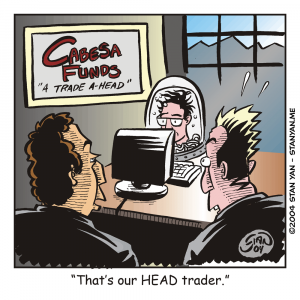Have you ever fallen out of bed early in the morning and just wanted to crawl back under the covers to avoid facing the stresses and strains of the markets? Perhaps you’ve been making trade after trade, and after lunch, you just wanted to quit early and take a nap. Or after a string of losing trades…At those times, you may feel so down and beat that you want to stay down and wallow in self-pity. Trading profitably requires both physical and emotional stamina. It’s essential to take precautions to make sure you can face the trading day with zeal.
When it comes to physical stamina, there’s no substitute for sleep and relaxation. As hard as you may try to trade in a serene and relaxed state of mind, trading is an adrenalin-pumping experience. It takes psychological energy to concentrate on the trade and stick with your trading plan. Your psychological energy is limited, however. When it gets depleted, you will have trouble forcing yourself to concentrate and you may make trading errors. Do yourself a big favour: don’t avoid sleep or skip meals. Be well-nourished and well-rested.
Psychological energy can be difficult to cultivate. One of the best ways to harness your psychological resources is to determine why you trade and remind yourself of these reasons all day. Why do traders engage in such a stress-producing activity? There’s no single “right” reason. It depends. But one thing is certain. It’s not for the money. Who does anything for money?
Money is merely a means to an end. Money is what is used to buy status, for example. Money can buy you a nice house, an exciting sports car, or a fashionable wardrobe. In our consumer-driven society, these symbols offer extreme, instant pleasure. They are highly motivating, and you may trade to obtain these objects. If you trade for these reasons, you will be highly motivated.
But there’s a downside you should be aware of. Your sense of accomplishment will be short-lived. Driving up the coast in a red Porsche is fun for a while, but it becomes commonplace eventually. At some point in time, you’ll want the turbo version, and later, a Ferrari. You’ll continually seek out new thrills and new excitement. It can be an addictive lifestyle in which you are constantly seeking a new high. Again, it will motivate you, but it may not work for very long.
Seasoned traders advise living a modest lifestyle. When you devote too much of your profits to securing and keeping material possessions, you end up putting pressure on yourself to maintain a lifestyle that is difficult to afford. Eventually, you crack under the strain.
Many seasoned traders, in contrast, love the profession because it helps them feel a sense of accomplishment. They have a rare talent, and they are driven to increase their skills as a means of achieving self-actualization, which is peak performance, inherently fulfilling mental state. They truly love what they do, and feel rewarded at the end of the day knowing that they are fulfilling their destiny.
For others, though, money or the pursuit of self-actualization isn’t enough. They need to believe they are fulfilling some higher purpose. Some people trade to provide their family with a good life, for example. If your priorities are to provide for your family, then it is vital that you remind yourself of this purpose throughout the trading day. Other people want to make a societal contribution.
If making such a difference motivates you, then consider donating some of your profits to charities. Still, others are interested in creating a legacy. They want to share their talents by training a new breed of traders. Teaching is a noble profession. If you want to help other traders, try sharing some of your experience with novice students of the markets.
The reasons people trade the markets are varied. There is not a single right reason. It depends on you. But whatever reason you trade the markets, it can do wonders for your motivation to keep these reasons in mind. Write them down on an index card and tape it to one of your monitors. Look at it throughout the day. The more you remind yourself of the reasons you trade, the easier it will be to overcome obstacles and enthusiastically persist in markets that aren’t always cooperative.


